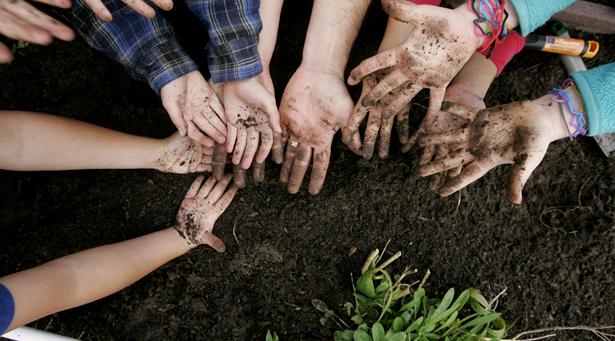Written by Heather Boorman of The Fringy Bit
I still don’t quite know how it happened. One minute, my 3 kiddos and I were sitting at the dinner table, laughing and enjoying a conversation that (miracle of miracles) didn’t involve arguing over who’s turn it was to talk. The next minute, my 12-year-old (Cub) was screaming from a potential broken nose, one of our dogs was missing, there was a dying bird on our porch, my 4-year-old (Chimp) was in tears for the bird, but quickly began running around through the neighborhood in his underpants to hunt down the missing dog, my 9-year-old (KBear) was furiously yelling at my 12-year-old, there was a UPS guy threatening to call Child Protection (ok, that might be an exaggeration), and I was standing there bewildered by how the evening fell so far off the rails.
Sadly, my bewildered moment was really just a brief intermission to be followed by the second Act, which went something like this: Cub sulks off in the corner (nose in one piece, by the way), KBear in full blown autistic meltdown, followed by impromptu birds and the bees talk with her after she’s more regulated (thanks Anne with an E for providing us with that teachable moment at bedtime. Yes, sarcasm intended).
I’m assuming, as parents of gifted or 2e kids, that you can relate. I’m assuming you know how the mood of an evening can turn on a dime, or a dying bird, as the case may be. I’m assuming that you’ve had those moments, standing in the driveway, trying to reign in the crazy, but feeling just as crazy as the rest of ‘em. Please tell me I’m not alone in this.
Parenting these gifted kiddos is a totally different monster than parenting a more typical kid. It can feel very isolating. Many, more neurotypical, families could have experienced the dying bird, the injured, nose, the runaway dog, and the package delivery without the same level of intensity. But, that’s gifted life. It’s intense.
So, how do we manage these crazy-making moments?
We remember to breathe. This too shall pass. Breathe in some calm and breathe out the crazy.
We remember that this is more intense than the average family life. Many kids would react to the sight of our cat delivering a half-dead bird to our doorstep, but Chimp’s emotional intensity took hold and his empathy and emotions were big and required extra effort to regulate. I’m not a bad mom because it took me 45 minutes to console the sensitive little soul in my arms; his emotions are simply that intense. Many kids would feel pain from a wildly thrown hard toy hitting their nose. (Thanks Chimp for your lack of impulse control and hugely rambunctious psychomotor intensity.) Cub’s sensual intensity meant that he felt that pain more acutely. It took him longer to feel better because the pain is bigger for him. Kbear’s strong sense of justice and emotional intensity, not to mention all the added complexity of her other exceptionalities, meant that she wasn’t just frustrated that her brother couldn’t find the leash quickly, she was in full blown rage. And the intellectual intensity of all 3 of them meant that within the course of this evening, I was having in-depth conversations about death, dying, euthanasia, sex and relationships. Which, really isn’t all that uncommon day to day. Remembering that this is more intense than typical parenting brings comfort to those moments when we just don’t feel like we can do this, or that we must be failing this parenting thing on a massive scale.
We call in reinforcements. Since everything turned so quickly, I couldn’t actually call in others to be there to help, but I could text others to remember that I’m not alone. My exact text to my husband, who was at work, says, “Oh my clusterf—“. You can decide if I actually filled in those last few letters or not! We really aren’t alone, even though it can feel like it. We actually do have people around who can commiserate. Whether they’re people you know IRL or only through the magic of the interwebs, there is support. My husband responded to the original text with a “vague texts do not become you” (yes, another gifted crazy-person lives in this house), to which I said, “Yep. I know. I just needed somebody else in the world to know that life got crazy for a while.” And that’s the truth. It helps to know that someone else knows.
We feel what we feel. We allow ourselves to cry and get huffy and be angry. We choose our behaviors as effectively as we can, and when we can’t, we show ourselves compassion.
We give ourselves a break . . . psychologically and concretely. We pour intense energy and love into our intense kids. We need intense recovery and rest, too.
We appreciate all those intensities in ourselves and our children. It might be a crazy life, but it’s also intensely rich.
And, we allow ourselves to laugh. To laugh at the amazing wit of our children. To laugh in shock as our small children use adult phrases and vocabulary perfectly. To laugh to keep from crying. To laugh at the surprising and amazingly quick responses from these people we’re honored to raise. To laugh at our own mistakes. To laugh at the ridiculousness of it all. And to laugh around the holiday tables in the decades to come, as we recount the night that we were eating dinner, cried for a dying bird, rescued a runaway dog, broke a nose, flashed our underoos to all the neighbors, worried the UPS man, and learned about sex.
Heather Boorman is a writer, public speaker, & Licensed Clinical Social Worker who provides therapy to kids, adults, and families at her private practice, Boorman Counseling, in Western Wisconsin. She and her husband Jon maintain a blog and podcast about the real life side to having a family with gifted and twice-exceptional children. The Fringy Bit is both refreshingly honest and full of helpful information. Make sure to check it out!



